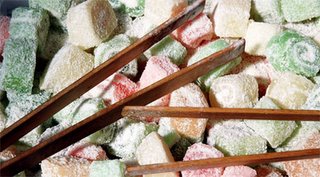
My wife and I wrestled with whether or not to take our kids to see Disney's latest release, The Chronicles of Narnia: The Lion, the Witch, and the Wardrobe. We were worried that they might have nightmares after seeing some of the scary images. After checking it out at screenit.com, we decided to go ahead and take them. We thought that with the right preparation and discussion afterward, they would benefit from the overall experience. That did turn out to be the case with our kids. No nightmares and a good reference point for helping them understand the gospel.
I took a look around the web to see what Christians were saying about the whole thing. The majority of reviews were good. There was one site, however, that claimed that C.S. Lewis wrote the popular series to teach children how to worship pagan deities and eventually turn them to Satanism. Oookaaay!?
There was a really good review called The Success of C. S. Lewis in The Chronicles of Narnia by Amber Cowart on a C.S. Lewis fan site that included a letter from Lewis to a young reader:
In The Voyage of the Dawn Treader, the fifth book of the series, Aslan tells the children that although they must return to their own world, they can find him there also (Hooper 123). Aslan says, "There I have another name. You must learn to know me by that name. This was the very reason why you were brought to Narnia, that by knowing me here for a little, you may know me better there" (Hooper 123). Some of Lewis' readers wonder what the significance of this statement is and begin to search for Aslan here on earth. Hila, an eleven year old girl from the United States asked Lewis what Aslan's name is in this world (Dorsett 31-32). His response was this:As to Aslan's other name, well I want you to guess. Has there never been anyone in this world who (1.) Arrived at the same time as Father Christmas. (2.) Said he was the son of the great Emperor. (3.) gave himself up for someone else's fault to be jeered at and killed by wicked people. (4.) Came to life again. (5.) Is sometimes spoken of as a Lamb.... Don't you really know His name in this world. Think it over and let me know your answer! (Dorsett 32)When Lewis' readers find Aslan in the real world, they will find out that his true name is Jesus Christ.
In the story, one of the brothers, Edmund, turns on the others in exchange for some "sweeties" as they call them. Specifically, he turns traitor for a sweet called Turkish delight. Oddly enough, the next day, one of my advertisers gave me a box of these same unusual candies for me and my family. I liked them, but Julie and the girls had an experience similar to this account I found while looking up the recipe for this exotic treat:
In The Lion, the Witch and the Wardrobe, Edmund Pevensie gobbled up several pounds of this treat in one sitting and clamored for more. The evil White Witch, Jadis, had magicked it up to win his fealty. As a child in Indiana, I hadn't realized that the confection actually existed. (Nor did I think that "wardrobes" existed anymore—surely, I reasoned, British people had closets by now.) I thought C.S. Lewis had invented it, knowing how much more vivid an imagined pleasure can be than a real one. But I loved to think about what it must taste like. I thought it would be crumbly and buttery and warm, like shortbread with walnuts, just out of the oven, with a rich, molten filling inside. "Each piece was sweet and light to the very center and Edmund had never tasted anything more delicious," Lewis wrote.
And so, with anticipation, I took a bite of the Turkish Delight. And a second later, spat it into my hand. It tasted like soap rolled in plaster dust, or like a lump of Renuzit air freshener: The texture was both waxy and filling-looseningly chewy. This … this? ... was the sweetmeat that led Edmund to betray his siblings and doomed Aslan to death on a stone slab? Watching the movie last week, I cringed watching Edmund push piece after squidgy red piece into his drooling mouth, shuddering to think that children in theaters everywhere were bound to start yammering for the candy and that on Christmas morning or Hanukkah nights, their faces would crumple with disappointment as their teeth sank into the vile jelly they had thought they wanted.
Funny, isn't it? The girls have decided they would like to work the Narnia series into our bedtime reading schedule. I hope they like it more than they did the Turkish Delights.
No comments:
Post a Comment